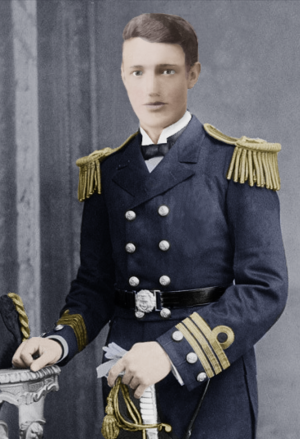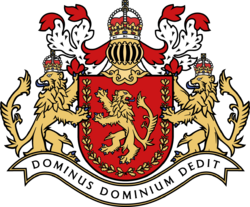Alexander II of Great Nortend
This article is incomplete because it is pending further input from participants, or it is a work-in-progress by one author. Please comment on this article's talk page to share your input, comments and questions. Note: To contribute to this article, you may need to seek help from the author(s) of this page. |
| King of Nortend, Cardoby and Hambria | |||||
|---|---|---|---|---|---|
 Alexander in 2000, as Captain of the Royal Naval College. | |||||
| Monarchy of Great Nortend | |||||
| Reign | 30 April 2003 – present | ||||
| Predecessor | Catherine II | ||||
| Heir apparent | William, The Prince of Rhise | ||||
| Lords High Treasurer | Andrew, Duke of Limmes William, Margrave of Bine Henry, Earl of Alsby | ||||
| Born | 9 July 1978 Palace of St Michael'sgate, Lendert-with-Cadell, Great Nortend | ||||
| Spouse | Katarina of Nikolia (m. 2004) | ||||
| Issue Detail |
| ||||
| |||||
| House | House of Anthord (Oln-Anthord-Mere-Luces) | ||||
| Father | Andrew, Duke of Faunslaughter | ||||
| Mother | Catherine II | ||||
| Religion | Church of Nortend | ||||
Alexander II, William Alexander George Nicholas de Anthord-Mere-Luces on the 9th of July, 1978, is the reigning Sovereign and monarch of the Kingdom of Nortend, Cardoby and Hambria. Known before his succession as Prince William, he acceded to the throne thereof at 5·32 a. m. on the 30th of April, 2003, after the passing of his mother, Catherine II. As well as his titles of King of Nortend and Hambria, he is also the Lord of Cardoby, Duke of St Parth and Hastica, Supreme Governour of the Church Mundane and Vicar of God.
Early life
William was born on Sunday, the 9th of July, 1978, at the Palace of St Michael'sgate during the 13th year of Catherine II's reign, at the age of 27. His father was the Prince Consort, HRH Prince Andrew, The Duke of Faunslaughter. The royal couple had only married two years prior, at the relatively advanced ages of 25 and 28, and it was considered a relief for the entire Royal family and court that they had begotten a son.
William was baptised a week after his birth, on the 16th of July, a Sunday too, by the Bishop of Lendert, the Rt. Rev'd Frederic Walfort, and was christened William Alexander George, after the Kings Alexander I, George III and his paternal grandfather, William, Duke of Faunslaughter.
William was tutored at home until the age of ten, when he was sent to Allord College. He was confirmed at the age of sixteen at the St Peter's Cathedral, Lendert-with-Cadell, on the 6th of December, 1994, taking the name of Nicholas after St Nicholas, whose feast day is the 6th of December, and also being invested as Prince of Rhise the same day. He graduated from the fifth form of Allord College in 1996 and was sent to the Royal Naval College at Canesea where he was commissioned as a midshipman aboard the training ship HEMS Southclive in 1997. He served for four years as the Captain of the College until 2002, when his mother's poor health led him to take up an increasing load of state duties.
Accession
At 5·32 a.m., on the 30th of April, 2003, Catherine II died, and William became King of Nortend, Cardoby and Hambria. He took the regnal name of Alexander II, to a homage to his ancestor, Alexander I, who acceded to the throne in 1603, nearly exactly 400 years prior.
Marriage
On the 3rd of February, 2003, William had announced his formal engagement and betrothal to Grand Princess Katarina of Nikolia, with a scheduled wedding on Sunday, the 7th of September. Katarina, who was of the Nikolian Catholic church, was not required to convert to the Church of Nortend as the two churches were and are in full communion with each other as schismatic churches of the Roman Catholic Church. However, the sudden death of Catherine II, William's mother, on the 30th of April that year threw the entire kingdom into a year-long period of court mourning. The wedding was rescheduled for the 5th of September, 2004, on which day the now King Alexander II married Katarina of Nikolia, now Queen of Nortend, Cardoby and Hambria, at St Peter's Cathedral in Lendert-with-Cadell.
Coronation
After the period of mourning, Alexander wished to be crowned with his fiancée, Katarina. Therefore, the date of his coronation was pushed back to after their wedding, which was to be held on the 5th of September. The Coronation of King Alexander II and Queen Katarina, therefore, was held on the 6th of September at Sulthey Cathedral where almost all Erbonian kings and queens had been crowned for centuries.
Reign
Alexander's reign has been marked with very few events of importance. Erbonian politics has been fairly stable in the decades since his accession in 2003. Alexander has been reported to be a relatively heavy spender, especially when compared to his mother, Catherine II.
He is, however, reported to have a poor relationship with William Fitzgerald, the 12th Marquess of Bine, who was appointed Lord High Treasurer in 2005 and served until 2009 in the position when his government was ousted from power by the Scodeliers. Bine was an advocate for the abolition of tariffs on foreign goods imported, which he saw as a damper on the Erbonian economy. Alexander fervently opposed this, and wrote on several occasions to admonish Bine. He refused to give his agreement to an Order in Council supported by Bine and his government which would have removed tariffs on agricultural and industrial goods; however, he agreed to reduce tariffs on the latter.
Alexander continued in his mother's tradition of performing royal walkabouts. In a first for the Erbonian royal family, Alexander has permitted special tours visiting the Palace of St Michael'sgate.
Titles, styles, honours and arms
Titles and styles
- 7 July 1978 – 6 December 1994: His Royal Highness The Prince William
- 6 December 1994 – 30 April 2003: His Royal Highness The Prince of Rhise
- 6 May 1910 – 20 January 1936: His Majesty The King
Alexander's full title as King is:
Alexander the Second, by the Grace of God, of Nortend and Hambria King, Lord of Cardoby, Duke of St Parth and Hastica, and of the Church Mundane Supreme Governour and Vicar of Christ.
Arms
Alexander's arms as King are the royal Coat of Arms of Great Nortend undifferenced. As Prince of Rhise, he bore his arms quartered, with the royal arms in the first and fourth quarters and the arms of the Duke of Morney in the second quarter, and the arms of the Earl of Scode in the third quarters, surmounted with a royal helm and his prince's coronet.
This page is written in Erbonian English, which has its own spelling conventions (colour, travelled, centre, realise, instal, sobre, shew, artefact), and some terms that are used in it may be different or absent from other varieties of English. |

